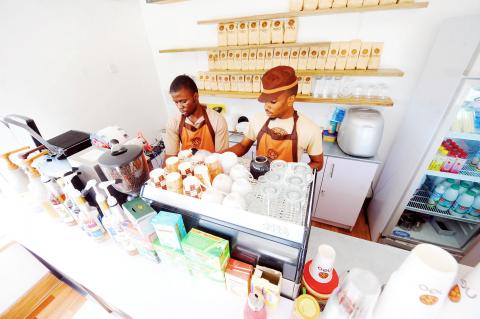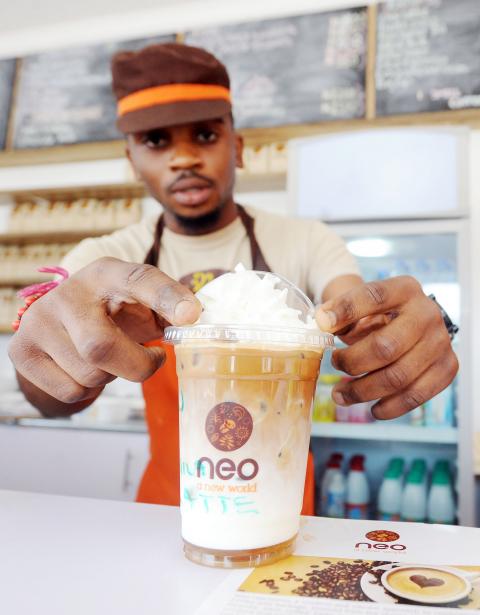Men in suits order takeaway cappuccinos at the counter. A trendy young crowd occupies comfortable sofas, armed with laptops for a brainstorming session over cafe lattes, frappuccinos and soft jazz.
The morning scene would not raise an eyebrow in New York, London or Paris, but cafe culture is a new phenomenon in Nigeria’s biggest city, where until recently finding a decent espresso was a battle.
The bright young things and senior managers were in Cafe Neo on Victoria Island in Lagos, which has been specifically designed to cater to the tastes of “repats.”

Photo: AFP
Ngozi Dozie and his brother Chijoke created the chain with returning Nigerians in mind, in the full knowledge that years spent abroad alter views, tastes and expectations.
Now the brothers hope to conquer Africa’s major cities with 100 percent African coffee before giants of the business such as Starbucks try to capture the market.
“The demand [in Lagos] is very high. There’s a significant minority of people who love coffee and want to drink coffee, but haven’t had access to coffee,” Ngozi Dozie said.

Photo: AFP
The “significant minority” have studied and worked abroad, coming back in their thousands from the US or Europe as austerity measures kicked in after the global financial crisis.
While they were away, Nigeria — already Africa’s most populous nation with about 170 million people — became the continent’s leading economy — and a country ripe with opportunity.
With economic growth has come an emerging middle class, which has increased sixfold to 4.1 million households between 2000 and last year, according to a recent study by Standard Bank.
A number of US chains such as KFC and Domino’s Pizza are already in Nigeria and increasingly popular, despite the astronomical costs of running a business in the country.
Poor or non-existent infrastructure forces businesses to rely on huge electricity generators to keep the lights on when the public supply goes off, sometimes for up to 12 hours a day.
The brothers’ idea is to first conquer the Nigerian market before Starbucks, which has more than 20,000 cafes in 65 countries across the globe, but none in sub-Saharan Africa.
Ngozi Dozie is not yet 40 and is himself a “repat.” Before embarking on the business venture, he knew friends who would bring back bags of coffee from the US.
He said he was inspired by India, where Cafe Coffee Day has largely cornered the market, despite the increasing presence of international chains such as Britain’s Costa Coffee or Starbucks.
“India is a fantastic example with Cafe Coffee Day,” he said. “We aim at something similar.
“We’re starting young right now and our aim is to grow as such that yes, Starbucks may come, but we want to be the choice of Nigerians, because there’s that affinity with something that comes from here, in Africa,” he said.
Neo currently has three cafes in Lagos and two others are scheduled to open early this year.
There is another outlet in Kigali. All the cafes only serve 100 percent Rwandan arabica, which has become one of its main selling points.
The chain is hoping to branch out across Africa and expects to have between 20 and 30 cafes in Lagos alone within the next four years.
“Neo, in Tswana, the language in Botswana, means ‘gift,’ and of course it also means ‘new’ in Latin,” Ngozi Dozie said.
“So, it’s a new way... a new approach to coffee, a new approach where we, as Africans, drink the coffee that we produce, that’s been a gift for us, as opposed to exporting it and importing sub-grade coffee,” he said.
Africa’s main coffee producers such as Ethiopia, Uganda and Rwanda export most of their products to the US and Europe.
Kayitana John Bosco was brought over to Nigeria from Rwanda to train locals on how to make a proper coffee at Cafe Neo — and said it was time for a change.
“Our first coffee tree was planted in 1904,” he said of his homeland. “We’ve been producing coffee for more than a century, but brewing, the consumption... it’s really still down.
“I visited a coffee farmer in 2007. That old man had been doing coffee farming for 20 years, but he didn’t know the taste of it,” he said.
“So, his job was to do farming, harvest, send. He didn’t know where it was going or what it was used for,” he said.

SEEKING CLARITY: Washington should not adopt measures that create uncertainties for ‘existing semiconductor investments,’ TSMC said referring to its US$165 billion in the US Taiwan Semiconductor Manufacturing Co (TSMC, 台積電) told the US that any future tariffs on Taiwanese semiconductors could reduce demand for chips and derail its pledge to increase its investment in Arizona. “New import restrictions could jeopardize current US leadership in the competitive technology industry and create uncertainties for many committed semiconductor capital projects in the US, including TSMC Arizona’s significant investment plan in Phoenix,” the chipmaker wrote in a letter to the US Department of Commerce. TSMC issued the warning in response to a solicitation for comments by the department on a possible tariff on semiconductor imports by US President Donald Trump’s

‘FAILED EXPORT CONTROLS’: Jensen Huang said that Washington should maximize the speed of AI diffusion, because not doing so would give competitors an advantage Nvidia Corp cofounder and chief executive officer Jensen Huang (黃仁勳) yesterday criticized the US government’s restrictions on exports of artificial intelligence (AI) chips to China, saying that the policy was a failure and would only spur China to accelerate AI development. The export controls gave China the spirit, motivation and government support to accelerate AI development, Huang told reporters at the Computex trade show in Taipei. The competition in China is already intense, given its strong software capabilities, extensive technology ecosystems and work efficiency, he said. “All in all, the export controls were a failure. The facts would suggest it,” he said. “The US

The government has launched a three-pronged strategy to attract local and international talent, aiming to position Taiwan as a new global hub following Nvidia Corp’s announcement that it has chosen Taipei as the site of its Taiwan headquarters. Nvidia cofounder and CEO Jensen Huang (黃仁勳) on Monday last week announced during his keynote speech at the Computex trade show in Taipei that the Nvidia Constellation, the company’s planned Taiwan headquarters, would be located in the Beitou-Shilin Technology Park (北投士林科技園區) in Taipei. Huang’s decision to establish a base in Taiwan is “primarily due to Taiwan’s talent pool and its strength in the semiconductor

French President Emmanuel Macron has expressed gratitude to Hon Hai Precision Industry Co (鴻海精密) for its plan to invest approximately 250 million euros (US$278 million) in a joint venture in France focused on the semiconductor and space industries. On his official X account on Tuesday, Macron thanked Hon Hai, also known globally as Foxconn Technology Group (富士康科技集團), for its investment projects announced at Choose France, a flagship economic summit held on Monday to attract foreign investment. In the post, Macron included a GIF displaying the national flag of the Republic of China (Taiwan), as he did for other foreign investors, including China-based